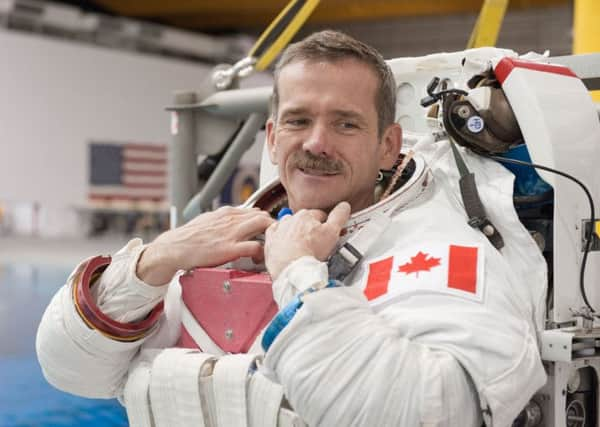'˜It is magical... to be free from the tyranny of gravity'


In 2013 Colonel Hadfield became the first Canadian to command the International Space Station, the fulfilment of a childhood dream that has guided his every step since he was a small boy.
Many children grew up watching science fiction on television, sitting glued to the 1969 moon landing and dreaming of walking in space, but very few ever realised that dream.
Advertisement
Hide AdAdvertisement
Hide AdColonel Hadfield is one of just a handful of people to have had the privilege.
“My interest originally came from science fiction,” he reveals, speaking ahead of his visit to Belfast later this month for the Northern Ireland Science Festival.
“I read a lot of books, comic books and watched Star Trek.
“I was immediately taken by Captain James T Kirk and Spock.
“When I watched the movie 2001: A Space Odyssey in 1967, I found it mind opening.
Advertisement
Hide AdAdvertisement
Hide Ad“It was originally science fiction that inspired me but what made it more possible was the moon landing so it was a combination of those two things.”
When he watched the moon landing in 1969, Colonel Hadfield dreamed that one day he would do the same thing, but to go from a little farm in a country that didn’t even have a space programme at the time, seemed impossible. That didn’t stop the determined nine-year-old boy.
“I was a little kid growing up in a remote part of Canada,” he said.
“I really don’t know what made me think it might be possible but it made me dream of being someone I wasn’t already.
Advertisement
Hide AdAdvertisement
Hide Ad“It was an unrealistic and long-held dream of something on the edge of magic.
“I never really expected to be an astronaut, I just used it as a way to shepherd my life along and choose what to do next.”
As a teenager he joined the Royal Canadian Air Cadets, earning a glider pilot scholarship at age 15 and a powered pilot scholarship at age 16, before going on to join the Canadian Armed Forces and serving as a fighter pilot.
“It was impossible,” he explained. “Canada didn’t have a space agency; we didn’t have rockets. It wasn’t anything I could realistically take my life towards; it was always just a long distance, best-case wish.”
Advertisement
Hide AdAdvertisement
Hide AdBut soon the impossible became possible when Canada formed a space agency in 1992 and put out a recruitment call. As expected, thousands of people applied for the astronaut programme and with each part of the selection process, as the numbers were reduced, Colonel Hadfield got one step closer to achieving his lifelong dream.
“The process began in late January and we didn’t find out until May,” he said. “There were 5,330 of us and we didn’t know how many they were going to choose.
“When I got the call my biggest feeling was of relief, mostly because I hadn’t let anybody down. I had been working on it for so long I would have felt I had disappointed myself, my wife and parents if I was told ‘no’. It was a wonderful sense of a door opening, a start of a new adventure.”
Colonel Hadfield served as an astronaut for 21 years and took part in three space flights during his career, first as a mission specialist in 1995 when he visited the Russian space station Mir; in 2001 when he visited the International Space Station and walked in space for the first time, and finally his third expedition was in 2013 when he became the first Canadian to serve as commander of the International Space Station.
The journey was everything he imagined, and more besides.
Advertisement
Hide AdAdvertisement
Hide Ad“It was better than I dreamed it would be,” he said. “When I arrived back I tried to figure out why and I think there are three reasons.
“Firstly, you are weightless; it is just plain magical to be able to fly, to push off with the most delicate touch and fly across the room, free from the tyranny of gravity.
“Second, you go around the world in 90 minutes; you see the entire planet. That view out of the window is mesmerising and enlightening.
“And third, it is immensely difficult and challenging and there’s a wonderful feeling of doing something hard and doing it really well.”